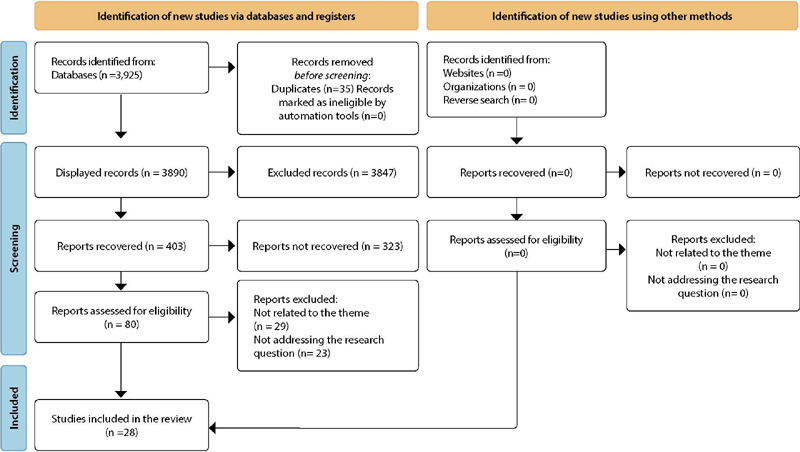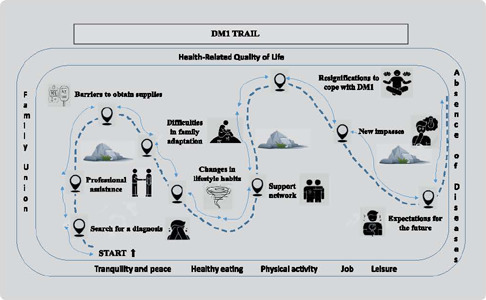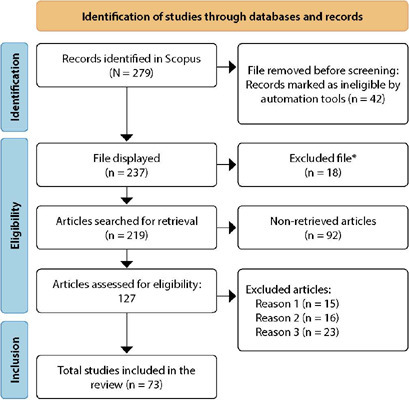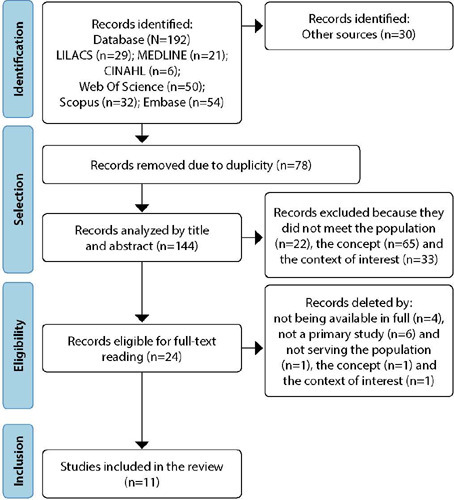-
EDITORIAL12-04-2023
A cronicidade e o seu impacto na saúde do trabalhador: uma chamada para ações concretas
Revista Brasileira de Enfermagem. 2023;76:e76suppl301
Abstract
EDITORIALA cronicidade e o seu impacto na saúde do trabalhador: uma chamada para ações concretas
Revista Brasileira de Enfermagem. 2023;76:e76suppl301
DOI 10.1590/0034-7167.202376suppl301pt
Views0A relação entre cronicidade e trabalho tem sido uma preocupação crescente na sociedade contemporânea. À medida que o número de doenças crônicas aumenta em todo o mundo, é fundamental compreender como essas condições impactam a saúde dos trabalhadores(). Neste editorial, exploraremos os impactos da cronicidade na saúde do trabalhador, destacando dados da Carga Global de […]See more -
EDITORIAL12-04-2023
Chronicity and its impact on workers’ health: a call for concrete actions
Revista Brasileira de Enfermagem. 2023;76:e76suppl301
Abstract
EDITORIALChronicity and its impact on workers’ health: a call for concrete actions
Revista Brasileira de Enfermagem. 2023;76:e76suppl301
DOI 10.1590/0034-7167.202376suppl301
Views0The relationship between chronicity and work has been a growing concern in contemporary society. As the number of chronic illnesses increases around the world, it is critical to understand how these conditions impact workers’ health(). In this editorial, we will explore the impacts of chronicity on workers’ health, highlighting data from the Global Burden of […]See more -
General Law on Personal Data Protection and applicability to Nursing
Revista Brasileira de Enfermagem. 2023;76:e20230126
Abstract
General Law on Personal Data Protection and applicability to Nursing
Revista Brasileira de Enfermagem. 2023;76:e20230126
DOI 10.1590/0034-7167-2023-0126
Views0See moreABSTRACT
Objectives:
to reflect on the impacts of the General Personal Data Protection Law on Nursing practice.
Methods:
reflection article, through the intentional collection of materials relating to the topic.
Results:
legislation regulates confidentiality, processing and data sharing, requiring institutional protection measures. The nursing team is responsible for acting preventively, both in care and in the management role, in order to avoid the misuse of the patient’s personal data. The law allows academic research to be carried out as long as the purpose is clear, data collection occurs with an explicit purpose and data is anonymized.
Final Considerations:
although the General Personal Data Protection Law requires greater care in relation to data processing, it is established on precepts of good faith and respect for the rights of the individual, concepts aligned with the nursing code of ethics.

-
REVIEW12-04-2023
Supervision of professional nursing practice in Brazil: a scoping review
Revista Brasileira de Enfermagem. 2023;76:e20230077
Abstract
REVIEWSupervision of professional nursing practice in Brazil: a scoping review
Revista Brasileira de Enfermagem. 2023;76:e20230077
DOI 10.1590/0034-7167-2023-0077
Views0See moreABSTRACT
Objectives:
to map studies that analyze the audit process of nursing councils.
Methods:
this is a scoping review, anchored in the JBI framework, with the guiding question: what is the evidence of the audit process of legal practice of nursing by class councils (COFEN/COREN system)? The searches were carried out in October and November 2022 without limitation of language and year.
Results:
of the 9 selected studies, all are Brazilian and published from 2014 onwards. Among the topics addressed are the role, challenges, costs and difficulties in nurse auditors’ daily work process, in addition to the contribution of the audit sector in Brazil.
Conclusions:
the studies gathered discuss aspects related to costs, challenges and difficulties, but there is no focus on corrective, disciplinary and educational activities as well as little is said about the audit process, its reporting, referral and outcomes.

-
ORIGINAL ARTICLE12-04-2023
Overview of nursing ethics teaching in Brazilian public higher education institutions
Revista Brasileira de Enfermagem. 2023;76:e20220808
Abstract
ORIGINAL ARTICLEOverview of nursing ethics teaching in Brazilian public higher education institutions
Revista Brasileira de Enfermagem. 2023;76:e20220808
DOI 10.1590/0034-7167-2022-0808
Views0See moreABSTRACT
Objectives:
to outline the teaching of ethics in undergraduate Nursing programs in Brazilian public higher education institutions.
Methods:
descriptive and exploratory study, carried out through the documentary analysis of pedagogical projects of undergraduate Nursing programs in Brazil.
Results:
153 active undergraduate Nursing programs were found, of which 106 provide the pedagogical project. In addition to deontological teaching, the teaching of ethics was identified in a transversal way associated with themes such as Social Context, Hospital and Community Care, Pharmacology, Systematization of Nursing Care, Surgical Nursing, Epidemiology, Palliative Care, Management in Nursing, Diversity, Women’s, Children’s, Adolescent’s, Adult’s and Older People’s Health, and Mental Health.
Final Considerations:
the challenge in teaching nursing ethics is its integration with each action of caring, teaching and managing.

-
Ethical dilemmas at the end of life: a reflection from the Philosophical Perspective of Luigina Mortari
Revista Brasileira de Enfermagem. 2023;76:e20220759
Abstract
Ethical dilemmas at the end of life: a reflection from the Philosophical Perspective of Luigina Mortari
Revista Brasileira de Enfermagem. 2023;76:e20220759
DOI 10.1590/0034-7167-2022-0759
Views0See moreABSTRACT
Objectives:
to reflect on the ethical dilemmas involved in the care of patients at the end of their lives.
Methods:
this is a theoretical-reflective study based on the ethics of care proposed by Luigina Mortari.
Results:
discussing care involves addressing the ways of being inherent to human existence and understanding the unique characteristics of this condition. Ethical care constitutes an action driven by interest in the other and by the perception of their need. Ethical dilemmas are a part of end-of-life care, making it essential to maintain respectful assistance that considers the patient’s autonomy, using strategies for expressing their wishes, and ensuring continuous clear and empathetic communication among all those involved in providing care.
Final Considerations:
issues related to being, stemming from one’s reality of dependency and vulnerability, contribute to the emergence of ethical dilemmas present in care actions.
-
ORIGINAL ARTICLE06-14-2024
Mid-range theory of the nursing diagnosis Overweight
Revista Brasileira de Enfermagem. 2024;77(2):e20230372
Abstract
ORIGINAL ARTICLEMid-range theory of the nursing diagnosis Overweight
Revista Brasileira de Enfermagem. 2024;77(2):e20230372
DOI 10.1590/0034-7167-2023-0372
Views0See moreABSTRACT
Objective:
To build a mid-range theory for the nursing diagnosis Overweight in adolescents and young adults.
Methods:
A methodological study in the light of the theoretical frameworks of Roy and of Lopes, Silva and Herdman. A total of 3,925 articles were retrieved and assessed using the State of the Art Through Systematic Review software. The final sample consisted of 28 articles.
Results:
The findings converged to 3 essential attributes, 13 antecedents, and 7 consequences. A mid-range theory was built consisting of an illustrated diagram, 11 propositions, and 12 causal relationships.
Final considerations:
From the creation of the theory, it was possible to better understand the nursing diagnosis Overweight within the context of adolescents and young adults. Understanding nursing phenomena contributes to nursing science’s advancement and strengthening.

-
ORIGINAL ARTICLE06-14-2024
Cardiovascular Risk and Lifestyle: comparison between teaching workers in Portugal and Brazil
Revista Brasileira de Enfermagem. 2024;77(2):e20230354
Abstract
ORIGINAL ARTICLECardiovascular Risk and Lifestyle: comparison between teaching workers in Portugal and Brazil
Revista Brasileira de Enfermagem. 2024;77(2):e20230354
DOI 10.1590/0034-7167-2023-0354
Views0ABSTRACT
Objective:
Compare Cardiovascular Risk between workers in Brazil and Portugal who work in the teaching context and its relationship with Lifestyle and Common Mental Disorder.
Methods:
Cross-sectional study that compared the cardiovascular health conditions of teaching workers in Manaus (Brazil) and Coimbra (Portugal). The odds ratio between groups was estimated.
Results:
The differences were: Smoking and hypercholesterolemia in participants from Portugal. Hypertension, chronic disease, increased abdominal perimeter, common mental disorder, and absence from work in Brazil. The variables with the greatest effect for high cardiovascular risk were: Country-Portugal [17.273 (95%CI1.538-193.951)], sex-male [61.577 (95%CI5.398-702.469)] and smoking [593.398 (95%CI57.330-6.142.020)].
Conclusion:
The differences in risk between groups showed that participants from Portugal, men, with high blood pressure and/or smokers are the most vulnerable to having a cardiovascular event. There is a need for interventions to promote cardiovascular health in the workplace in both countries.
Keywords:Community-Based Participatory ResearchHeart Disease Risk FactorsLife StyleOccupational HealthUniversitiesSee more -
ORIGINAL ARTICLE06-14-2024
Functional performance assessment scale for children and adolescents with cancer: cross-cultural study
Revista Brasileira de Enfermagem. 2024;77(2):e20230331
Abstract
ORIGINAL ARTICLEFunctional performance assessment scale for children and adolescents with cancer: cross-cultural study
Revista Brasileira de Enfermagem. 2024;77(2):e20230331
DOI 10.1590/0034-7167-2023-0331
Views0ABSTRACT
Objectives:
to describe the methodological process of cross-cultural adaptation of the PlayPerformance Scale for Children to Brazilian Portuguese.
Methods:
methodological study of translation and cross-cultural adaptation in six stages: translation, synthesis of translations, back-translation, evaluation by a committee of judges, evaluation by expert nurses, and pretest. The agreement and representativeness of the items were assessed using the content validity index. A minimum value of 80% agreement was considered.
Results:
all stages of the translation and cross-cultural adaptation process were satisfactory. In the evaluation performed by the committee of judges, all items obtained agreement above 80%. Fifteen pediatric nurses conducted the content validation, suggesting necessary modifications for understanding and application. Thirty children and adolescents with cancer were assessed with the scale for the pre-test.
Conclusions:
the scale was cross-culturally adapted to Brazilian Portuguese. The need for psychometric testing in a consistent sample is emphasized.
Keywords:Cross-Cultural ComparisonNursing Methodology ResearchOncologyPediatric NursingPhysical Functional PerformanceSee more -
ORIGINAL ARTICLE06-14-2024
Meanings attributed to health-related quality of life by caregivers of adolescents with diabetes
Revista Brasileira de Enfermagem. 2024;77(2):e20230314
Abstract
ORIGINAL ARTICLEMeanings attributed to health-related quality of life by caregivers of adolescents with diabetes
Revista Brasileira de Enfermagem. 2024;77(2):e20230314
DOI 10.1590/0034-7167-2023-0314
Views0See moreABSTRACT
Objective:
to interpret the meanings attributed to the health-related quality of life by caregivers of adolescents with type 1 diabetes mellitus.
Methods:
qualitative, descriptive-exploratory study of 14 caregivers of adolescents with diabetes developed at the reference outpatient clinic for endocrine diseases in a city in the state of Paraíba. Interviews were performed between May and September 2021. Inductive thematic analysis of the empirical material, and its interpretation in light of the concepts of health-related quality of life and family functioning were performed.
Results:
the meanings attributed by caregivers to the health-related quality of life of adolescents converged on the feeling of being healthy, healthy eating, satisfactory family income, family involvement in care and effective access to the care network.
Final Considerations:
knowledge of these meanings enables health professionals to develop strategies that meet the unique demands of caregivers experiencing this diagnosis.

-
REVIEW06-14-2024
Critical analysis of the scientific production on Jean Watson’s Theory of Human Care
Revista Brasileira de Enfermagem. 2024;77(2):e20230231
Abstract
REVIEWCritical analysis of the scientific production on Jean Watson’s Theory of Human Care
Revista Brasileira de Enfermagem. 2024;77(2):e20230231
DOI 10.1590/0034-7167-2023-0231
Views0See moreABSTRACT
Objectives:
to analyze current scientific production on the use of the theoretical-methodological precepts of Jean Watson’s Theory of Human Care/Clinical Caritas Process.
Methods:
quantitative, exploratory, descriptive study using data from 1979 to 2023 in the Scopus database. Analysis was carried out using VOSviewer software.
Results:
the 73 studies included establish a network of collaboration among 221 authors from 155 institutions in 18 countries, who discuss the development of ethical behavior in nursing staff, through technical improvement, implementation, and validation of instrumental strategies capable of measuring and evaluating the quality of holistic and empathetic care. The Theory of Human Caring contributes to nursing training and care, and Process Clinical Caritas-Veritas is useful for the different possibilities of practice and education.
Conclusions:
it is important to strengthen with more empirical data a nursing work model centered on individual human care, supporting the evolution of scientific nursing knowledge.

-
REVIEW06-14-2024
Primary health care professionals’ practice in the face of leprosy: a scoping review
Revista Brasileira de Enfermagem. 2024;77(2):e20230207
Abstract
REVIEWPrimary health care professionals’ practice in the face of leprosy: a scoping review
Revista Brasileira de Enfermagem. 2024;77(2):e20230207
DOI 10.1590/0034-7167-2023-0207
Views0See moreABSTRACT
Objectives:
to identify Primary Health Care professionals’ practice in the face of leprosy.
Methods:
a scoping review, carried out between November 2022 and January 2023, conducted according to the methodological structure proposed by JBI and checklist Preferred Reporting Items for Systematic Reviews and Meta-Analyses extension for Scoping Reviews in six databases and additional literature.
Results:
the sample consisted of 11 articles, published between 2008 and 2022. The findings were synthesized into three categories: Early diagnosis and timely treatment; Physical disability prevention; and Household and social contact surveillance.
Final Considerations:
there is a need to align the practices carried out with those recommended by the Brazilian National Program for Leprosy Control and Elimination, as some were not identified in studies, which implies losses to qualified assistance directed to patient demands, with a view to control and elimination of leprosy.

-
ORIGINAL ARTICLE06-14-2024
Validity of the TBApp mobile application for self-care management for people with tuberculosis
Revista Brasileira de Enfermagem. 2024;77(2):e20230195
Abstract
ORIGINAL ARTICLEValidity of the TBApp mobile application for self-care management for people with tuberculosis
Revista Brasileira de Enfermagem. 2024;77(2):e20230195
DOI 10.1590/0034-7167-2023-0195
Views1See moreABSTRACT
Objectives:
to describe the validity process of the TBApp mobile application for self-care management for people with tuberculosis linked to Primary Health Care.
Methods:
methodological research developed with ten expert judges, carried out virtually. The application was assessed in relation to content and technology quality in seven domains (objectivity; structure and appearance; relevance; functionality; reliability; usability; and efficiency), using an instrument with a Likert scale.
Results:
TBApp was considered valid, relevant, functional, reliable and effective by expert judges. The objectives, structure and presentation and relevance domains presented an overall Content Validity Index of 0.93, and the functionality, reliability, usability and efficiency domains presented characteristics and sub-characteristics values greater than 0.80.
Conclusions:
TBApp is a creative and innovative tool that can be used by people with TB and disseminated in the scientific community.
-
EDITORIAL01-01-2016
Discoveries of Biological Sciences and their implications for nursing practice
Revista Brasileira de Enfermagem. 2016;69(4):619-620
Abstract
EDITORIALDiscoveries of Biological Sciences and their implications for nursing practice
Revista Brasileira de Enfermagem. 2016;69(4):619-620
DOI 10.1590/0034-7167.2016690401i
Views1For the longest time, the production of knowledge in the field of biological sciences was viewed as the exclusive responsibility and competence of medical professionals. This scenario has changed in light of the worldwide trend of improvements in other health professions, which includes the need to implement the use of evidence-based methodology in nursing practice. […]See more -
EDITORIAL01-01-2016
Descobertas das Ciências Biológicas e as implicações para a prática da Enfermagem
Revista Brasileira de Enfermagem. 2016;69(4):619-620
Abstract
EDITORIALDescobertas das Ciências Biológicas e as implicações para a prática da Enfermagem
Revista Brasileira de Enfermagem. 2016;69(4):619-620
DOI 10.1590/0034-7167.2016690401i
Views0A produção de conhecimento na área das ciências biológicas, durante muito tempo, foi vista como de responsabilidade e competência exclusivamente de profissionais médicos. Esse cenário alterou-se frente à tendência mundial de aperfeiçoamento dos demais profissionais de saúde, incluindo-se a necessidade de se concretizar a utilização da metodologia da prática baseada em evidência na atuação do […]See more -
REVIEW01-01-2016
Effects from acupuncture in treating anxiety: integrative review
Revista Brasileira de Enfermagem. 2016;69(3):602-609
Abstract
REVIEWEffects from acupuncture in treating anxiety: integrative review
Revista Brasileira de Enfermagem. 2016;69(3):602-609
DOI 10.1590/0034-7167.2016690325i
Views0See moreABSTRACT
Objective:
to evaluate the scientific evidence that is available in the literature on the effects of acupuncture for treating anxiety and on the quality of such studies.
Method:
the study is an integrative review of CINAHL, LILACS, PUBMED-PICO, SciELO, and The Cochrane Library between 2001 and 2014. Keywords anxiety, acupuncture therapy, acupuncture, and anxiety disorders were combined among themselves to ensure a wide search of primary studies.
Results:
among 514 articles, 67 were selected to be fully read and 19 were included. Among these, 11 were found to have strong evidence levels. Among the six articles about randomized clinical studies, five were found to be of reasonable quality. Two studies used acupuncturist nurses to perform their interventions. Its results showed positive and statistically significant effects from using acupuncture for treating subjects with anxiety.
Conclusion:
acupuncture seems to be a promising treatment for anxiety; however, there is a need for improving the methodological quality of the research on this field.
-
REVIEW01-01-2016
Palliative care and spirituality: an integrative literature review
Revista Brasileira de Enfermagem. 2016;69(3):591-601
Abstract
REVIEWPalliative care and spirituality: an integrative literature review
Revista Brasileira de Enfermagem. 2016;69(3):591-601
DOI 10.1590/0034-7167.2016690324i
Views0See moreABSTRACT
Objective:
to analyze scientifi c articles published in international online journals about palliative care and spirituality.
Methods:
an integrative literature review with data collected in September 2014 from the LILACS, SCIELO, MEDLINE/PubMed, and IBECS databases.
Results:
thirty-nine publications were identifi ed and their textual analysis facilitated through four thematic approaches: the meaning of spirituality in the context of palliative care; palliative care and spiritual support; spirituality and relief of pain and other symptoms in patients under palliative care; and instruments to evaluate the spiritual dimension of the scope of palliative care.
Conclusion:
this study examined the relevance of the spiritual dimension in the care of patients with palliative care and the need for developing new studies to disseminate knowledge about this topic.
Descriptors:
Palliative Care; Palliative Care at End of Live; Spirituality; Religion; Health.
-
REVIEW01-01-2016
Educational technologies to encourage (self) care in postpartum women
Revista Brasileira de Enfermagem. 2016;69(3):582-590
Abstract
REVIEWEducational technologies to encourage (self) care in postpartum women
Revista Brasileira de Enfermagem. 2016;69(3):582-590
DOI 10.1590/0034-7167.2016690323i
Views0See moreABSTRACT
Objective:
to evaluate national and international literature regarding the use of educational technologies to encourage self care in postpartum women.
Method:
an integrative review of the literature. The articles were collected from the CINAHL, SCOPUS, PubMed, SciELO, LILACS and Cochrane databases; the time period for the articles referred to January/2004 to July/2014; the languages used in the articles were Portuguese, English, Spanish and French; the articles were selected from the following descriptors: postpartum care period, educational technology, nursing and self care. Twenty-seven articles were selected for analysis
Results:
based on the information found, the scales, counseling and home visits were among the most recommended educational technologies.
Conclusion:
the technologies promote communication, but are sometimes dependent on computer and internet access, which hinder their use by low-income women.

-
RESEARCH01-01-2016
Patients with HIV/Aids and ulcer risk: nursing care demands
Revista Brasileira de Enfermagem. 2016;69(3):574-581
Abstract
RESEARCHPatients with HIV/Aids and ulcer risk: nursing care demands
Revista Brasileira de Enfermagem. 2016;69(3):574-581
DOI 10.1590/0034-7167.2016690322i
Views0See moreABSTRACT
Objective:
to analyze the demand for nursing care and the risk of pressure ulcers (PU) of patients with HIV/Aids.
Method:
quantitative survey, carried out from December 2012 to March 2013 in a public hospital of Teresina, state of Piauí, Brazil.
Results:
the sample of 31 patients was predominantly male, mean age 36.6 years, average care demand 49.4%, most showing some risk of developing PU. The variables correlated with PU risk were care demand and clinical outcome (death). Those associated with care demand were age and clinical outcome (death).
Conclusion:
the results showed that patients require moderate nursing care needs and most of them present risk of developing PU.

Search
Search in:
Nuvem de Tags
Aged (144) Atenção Primária à Saúde (239) COVID-19 (104) Cuidados de Enfermagem (269) Educação em Enfermagem (151) Educação em Saúde (139) Enfermagem (930) Estudos de Validação (131) Health Education (144) Idoso (208) Mental Health (149) Nursing (987) Nursing Care (306) Patient Safety (151) Primary Health Care (284) Qualidade de Vida (104) Quality of Life (106) Saúde Mental (145) Segurança do Paciente (150) Validation Studies (108)



